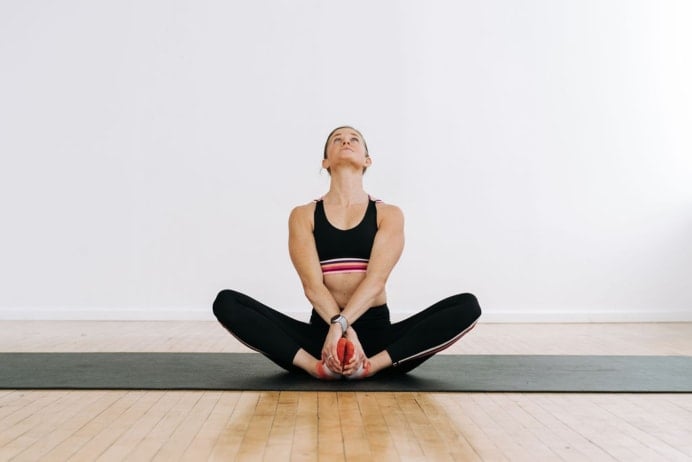
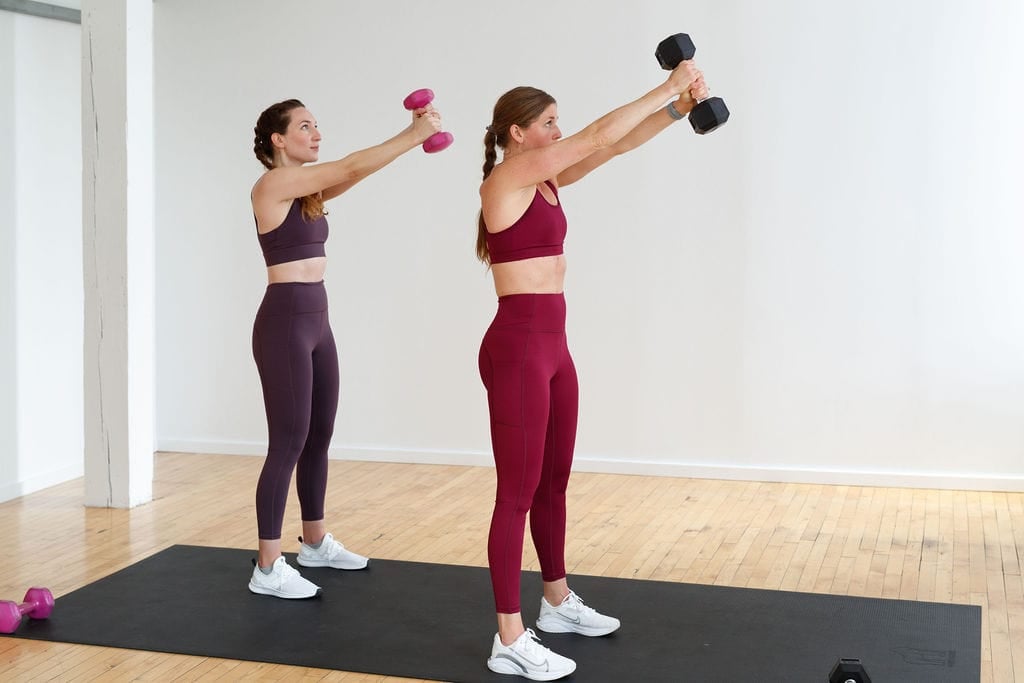
15-Minute Strength Workout (Full Body Strength Training, Dumbbells)
Short on time but want a full body workout? Try this 15-Minute Full Body Strength Workout with dumbbells! Upper body strength, lower body strength and core strength. This home workout hits every major muscle group, using just a set of dumbbells, in 15 minutes.
The ultimate full body strength workout with dumbbells.
Strength training is my go-to for any season of life. It’s a naturally low impact workout, making it a great addition to any beginner, pregnancy or postpartum workout plan.
I particularly love this 15-minute strength workout because it hits EVERY muscle group in a quick but effective way (hello burnout exercises).
This is a great standalone full body workout when you’re short on time. I personally love to add this onto a run or bike ride.

Strength Workout FAQs
Strength training is so important for EVERYONE, but I’m a huge advocate for women picking up weights. For so long, women were told they would get “bulky” if they lifted weights, and that’s simply not true! Strength training increases metabolism, builds lean muscle, burns body fat, reduces the risk of heart disease, enhances mood and reduces stress.
If you know me, you know I’m all about a split training workout routine. BUT full body workouts definitely have their place in my workout programs! A full body strength workout will help you build strength and lean muscle mass, burn calories for hours after exercise, boost your metabolism and make weight loss easier. A total body strength workout is great because you’re being efficient by using compound exercises to hit all major muscle groups at once.
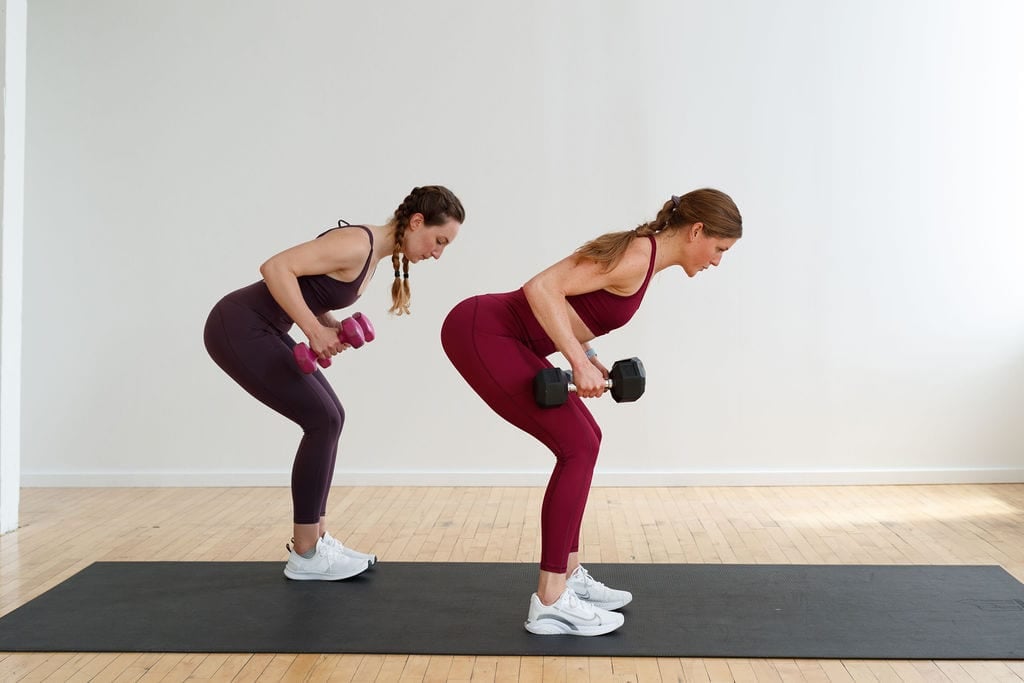
15-Minute Full Body Strength Workout with Dumbbells
Build muscle and total body strength in just 15 minutes with these 9 compound exercises.
This is my favorite 15-minute full body strength workout to add to my weekly training plan 1-2 times a week.
Because these 9 full body exercises activate larger muscle groups (arm and leg muscles working at the same time), I suggest lifting heavy. The last 2-3 reps of each exercise should be challenging.
Workout Equipment:
A medium-to-heavy set of dumbbells.
I recommend 8-20 lbs depending on your fitness level. We are using 12-15 lbs in this workout video.
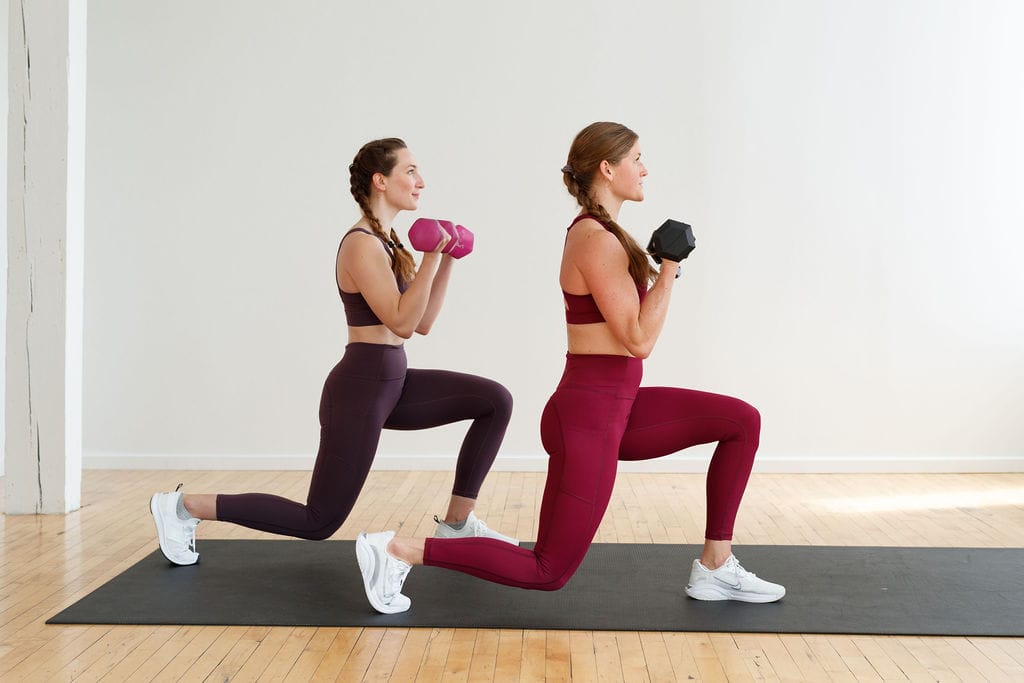
Workout Instructions:
Follow along with the guided Full Body Strength Workout on YouTube, led by certified personal trainer, Lindsey Bomgren.
Your Workout Looks Like This:
- 4 Circuits (2 full body exercises per circuit)
- Timed Intervals (40 seconds work per strength exercise followed immediately by a 20 second burnout exercise. Rest 20 seconds.)
- Repeat Each Circuit x2 Sets
Workout Outline
CIRCUIT ONE:
- Goblet Squat and 45-Degree Press Out
- 45-Degree Dumbbell Press Out
CIRCUIT TWO:
- Lateral Lunge, Reverse Lunge and Bicep Curl
- Isometric Lunge Hold and Hammer Curl
CIRCUIT THREE:
- 2 Wide Squats and 1 Push Up
- Push Ups
CIRCUIT FOUR:
- Deadlift and Back Row
- Plank and Row
BONUS ROUND
- Low Plank Wide Knee Pulls
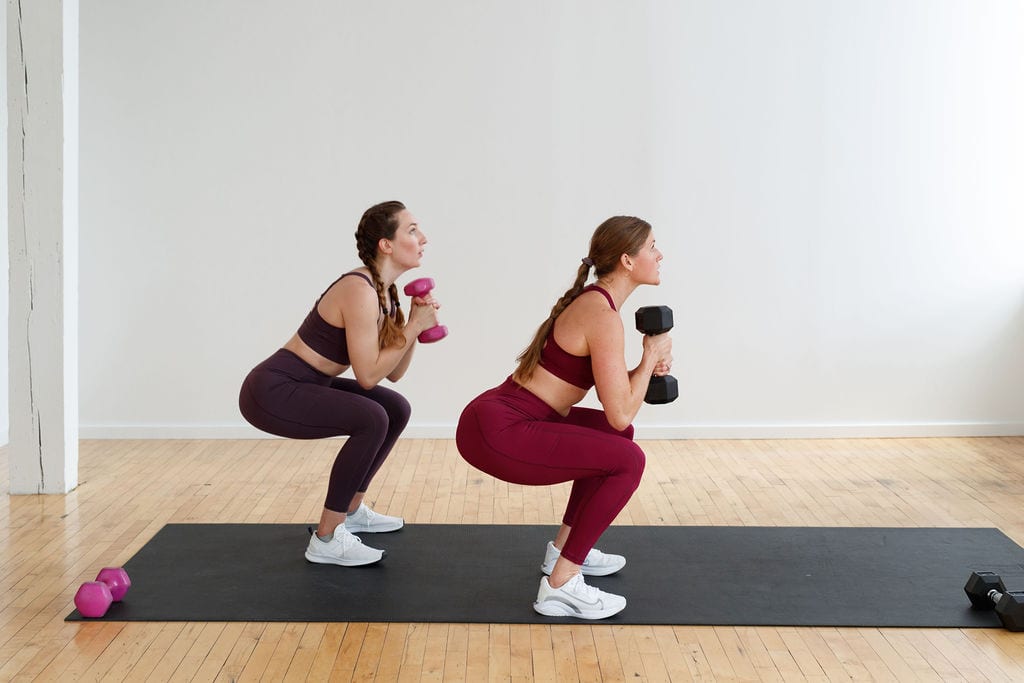
Prefer to Watch On YouTube?
9 Full Body Strength Training Exercises
Goblet Squat And 45-Degree Press Out
Targets: Legs, glutes, quads, chest, shoulders, triceps and core.
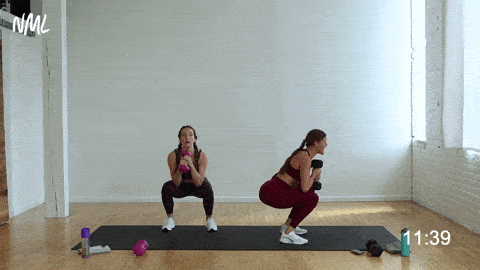
How To Do A Goblet Squat And 45-Degree Press Out
- Stand with your feet slightly wider than shoulder width apart, knees bent. Hold a dumbbell vertically at your chest with hands stacked on top of each other.
- Sit your hips back as you lower into a squat, aiming to get your thighs parallel to the ground (90-degree bend in your knees). Dumbbell at your chest and elbows inside your knees.
- Press through your heels to stand tall. As you stand, press the dumbbell out at a 45-degree angle, arms straight.
- With control, return the dumbbell to your chest to return to the starting position.
45-Degree Dumbbell Press Out
Targets: Arms, upper body push muscles (chest, shoulders and triceps) and core strength.
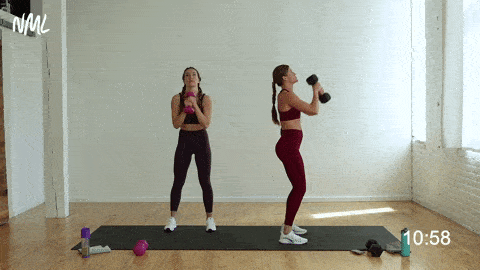
How To Do A 45-Degree Dumbbell Press Out
- Start standing, feet hip width apart, knees bent softly. Hold one dumbbell vertically at your chest with hands stacked on top of each other.
- Exhale as you press the dumbbell out away from your body at a 45-degree angle, arms fully extended.
- With control, return the dumbbell to your chest to return to the starting position.
Lateral Lunge, Reverse Lunge And Bicep Curl
Targets: Legs, glutes, quads, inner thighs, outer glutes, core, arms and biceps.
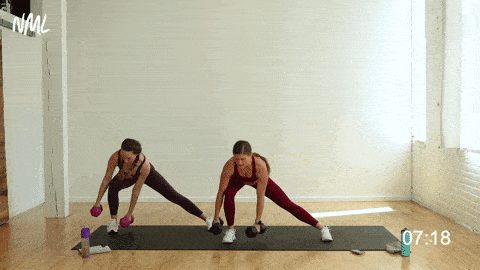
How To Do A Lateral Lunge, Reverse Lunge And Bicep Curl
- Start standing, feet hip width apart, knees bent. Hold one dumbbell in each hand at your sides (palms facing in towards your hips).
- Step your left leg out to the side as you push your hips back, bending your left knee while leaving your right leg straight. Think of performing a single leg squat with your left leg while your right leg remains straight. Dumbbells frame left foot with knees and toes pointing forward.
- Then, drive off your left foot to reverse the movement, pushing back to center.
- Once standing, step your left leg back into a reverse lunge, dropping your left knee down towards the ground as you lower your hips until both knees reach a 90-degree angle, front thigh parallel to the floor. As you drop your left leg back, curl the dumbbells up to shoulder height (bicep curl).
- Then squeeze your right leg glute, driving your back, left leg forward as you stand up, returning to starting position. Reverse your dumbbell curl, returning the dumbbells back to the starting position.
Isometric Lunge Hold And Hammer Curl
Targets: Legs, glutes, quads, calves, core, arms and biceps.
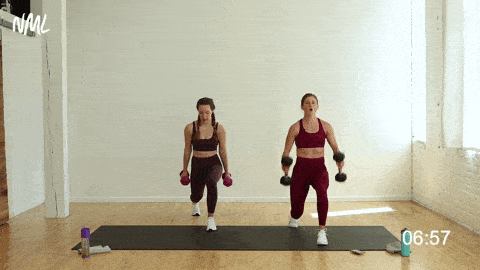
How To Do An Isometric Lunge Hold And Hammer Curl
- Hold a reverse lunge: step your left leg back, dropping your left knee down towards the ground as you lower your hips until both knees reach a 90-degree angle, front thigh parallel to the floor.
- Hold this position, hovering your back left knee off the ground.
- Hold one dumbbell in each at hand at your sides, palms facing in towards each other (hammer grip). Curl the dumbbells up towards your shoulders.
- Then with control, lower back to the starting position. Repeat the hammer curl movement as you hold the lunge position.
Modification: Omit the isometric lunge hold and perform standing hammer curls.
2 Wide Squats And 1 Push Up
Targets: Legs, glutes, quads, inner thighs, outer glutes, arms, chest, shoulders, triceps and core.
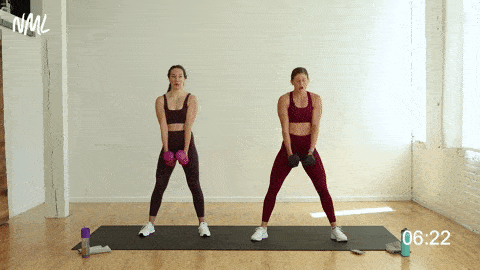
How To Do 2 Sumo Squats And 1 Push Up
- Stand with feet wider than hips, heels in and toes pointed out (sumo squat stance). Hold one dumbbell in each hand between your legs.
- Bend your knees to lower down into a squat, pushing your knees out towards your pinky toes as you drop your hips parallel to your knees.
- Drive through your heels to stand tall. Then perform a second sumo squat.
- On the second squat, lower the dumbbells all the way down to the mat. Then step or jump your feet back to high plank position.
- In high plank, place your hands on the dumbbells and engage your core. Create a straight line from head to tailbone.
- Lower your chest towards the ground, performing a push up on dumbbells. Elbows fall back towards your hips. Exhale as you press back up to high plank.
- Then step or jump your feet outside of your hands, landing in a low wide squat position (or sumo squat stance) and repeat the sequence.
Modification: Drop to your knees for the push up as needed. Also, option to drop the weights and perform as a bodyweight exercise.
Push Up
Targets: Chest, shoulders, triceps and core.
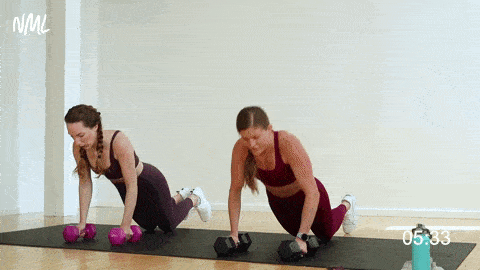
How To Do Push Ups
- Start in a high plank position with your shoulders stacked over your wrists, weight evenly distributed amongst all 10 fingers. Pull your kneecaps up towards your belly, feet hip-width apart. Option to place your hands on weights if you have wrist pain.
- Hold this plank position, maintaining a straight line with your body, gaze slightly in front of you.
- Slowly lower your chest down towards the ground as your elbows fall back towards your hips (not out to the sides).
- Once at the bottom of your push up, exhale as you push back up into high plank position.
Modification: Drop to your knees for the push up as needed. Or add an incline, placing your hands/dumbbells, on a bench or chair to bring the ground closer to you.
Deadlift And Back Row
Targets: Legs, glutes, hamstrings, hips, core, arms and back muscles.
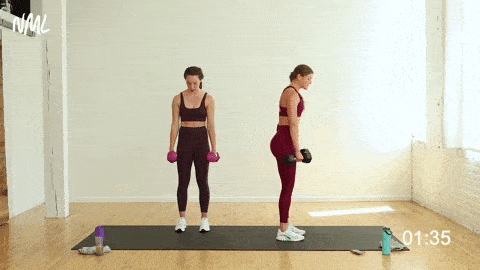
How To Do A Deadlift And Back Row
- Start standing, feet shoulder-width apart, soft bend in the knees. Hold one dumbbell in each hand (palms facing in).
- Roll your shoulders down and back to engage your lats (back muscles).
- Hinge your hips back towards the wall behind you as you lower the dumbbells along the front of your legs. Keeping the dumbbells close to your body (thighs and shins). This is a deadlift.
- Hold at the bottom of your deadlift, with a flat back and neutral spine.
- Then squeeze your shoulder blades together to pull the dumbbells up towards your rib cage. This is a back row.
- Lower the dumbbells with control.
- Drive through your heels to return to the starting position (standing with the dumbbells at your sides).
Plank And Row
Targets: Arms, back, shoulders and core.
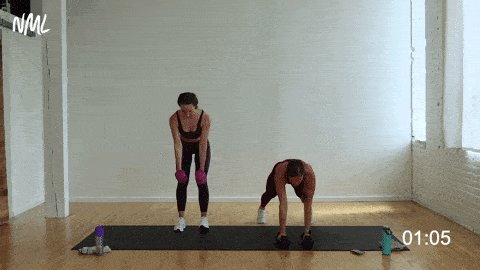
How To Do A Plank And Row (Or Standing Bent Over Back Row)
- Start in high plank position with one hand on each dumbbell (shoulders stacked over hands on dumbbells).
- Hold this position, maintaining a straight line with your body, gaze slightly in front of you.
- From this plank position, engage your core as you pull your right elbow back towards your hip, then lower with control back to the mat.
- Then repeat this row movement on the left side of the body. Maintain the high plank throughout.
Modification: Drop to your knees, performing the rows from your knees. Option to take the rows from a standing, bent over row position.
Low Plank Wide Knee Pulls
Targets: Abs, core, obliques and shoulders.
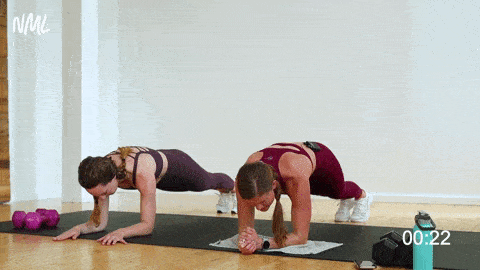
How To Do Low Plank Wide Knee Pulls
- Start in a low plank position, forearms on the mat with shoulders stacked over elbows. Think about forming one long line from your head through your heels, engaging your core to make sure your hips don’t pike up or drop down.
- Pull your right knee to your right elbow or tricep, then return to low plank position.
- Then pull your left knee to your left elbow or tricep, then return to low plank position.
- Repeat these alternating knee pulls.
Modification: Hold low plank from the knees or toes. Or add an incline, placing your hands or forearms, on a bench or chair to bring the ground closer to you.
More Workouts
Strength WorkoutsPin this Full Body Strength Training Workout:
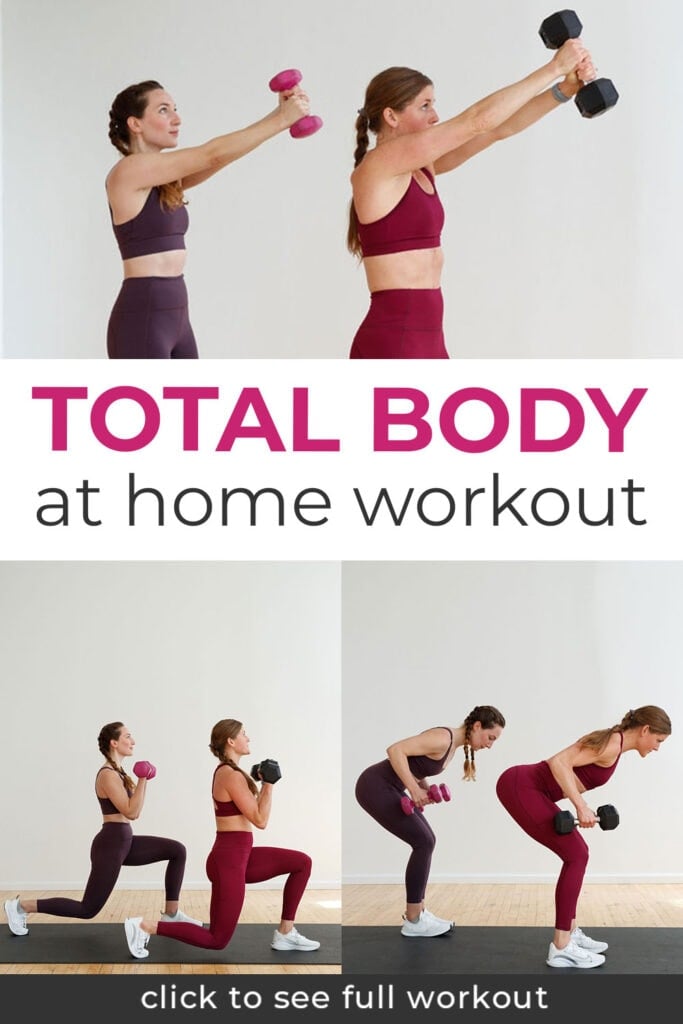
This post includes affiliate links. I do make a small commission for products purchased using these links (at no additional cost to you). Thank you for supporting Nourish Move Love, making the content you see on this blog possible.










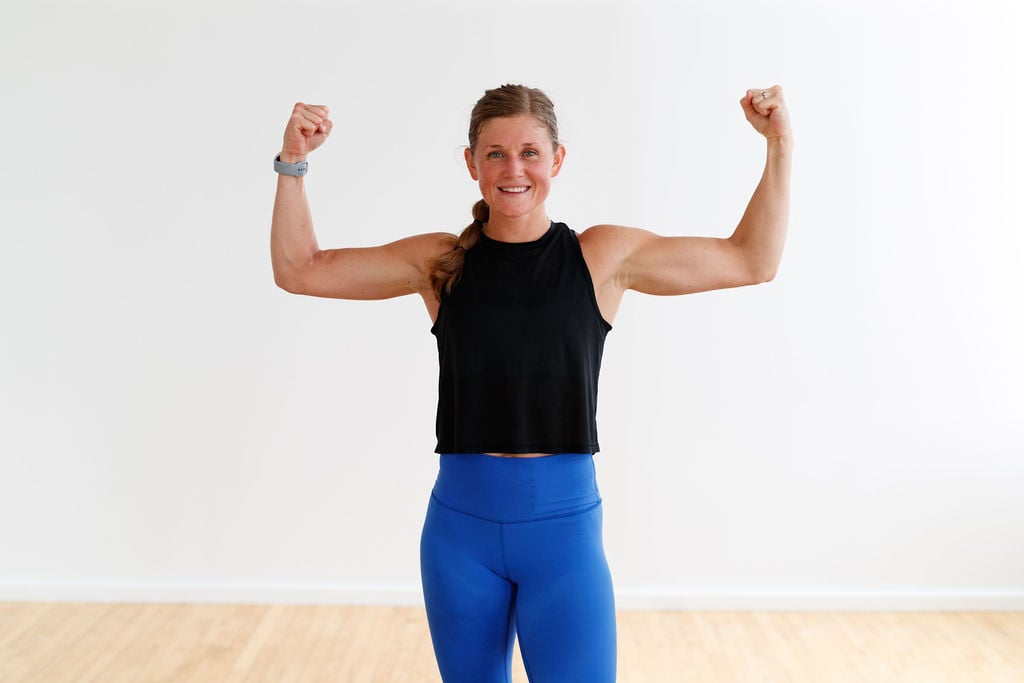
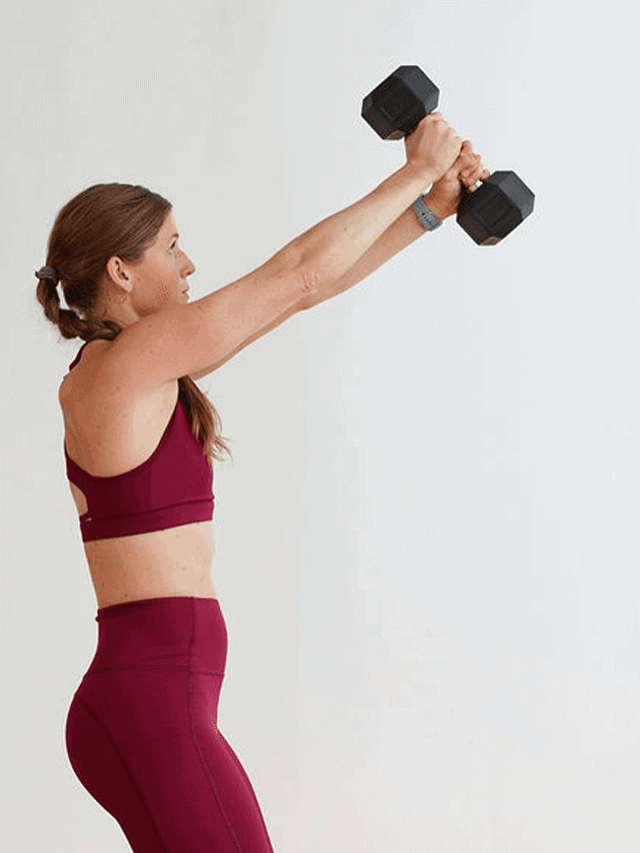
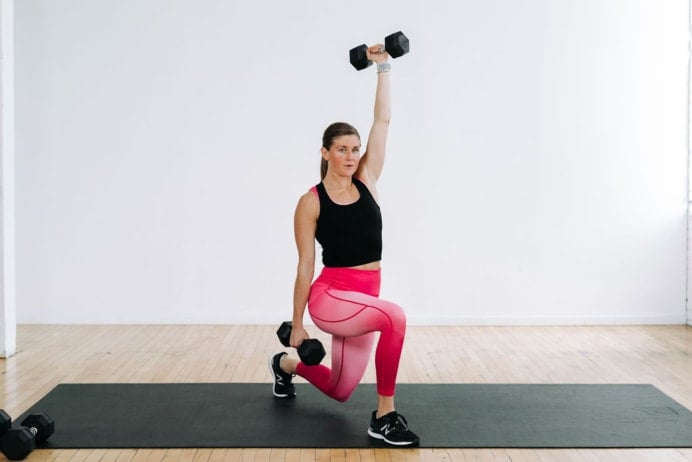
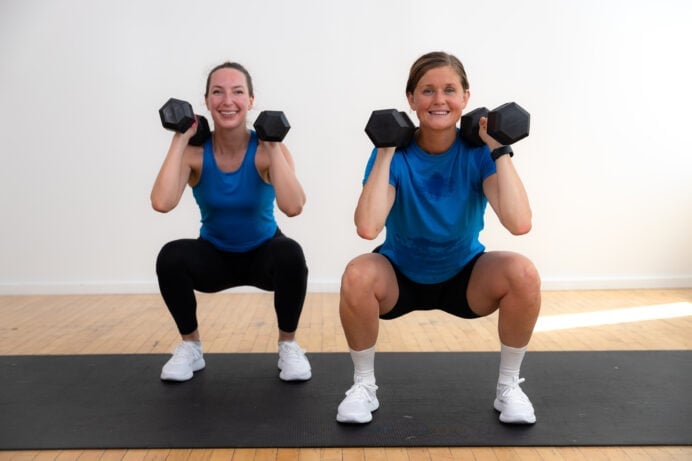
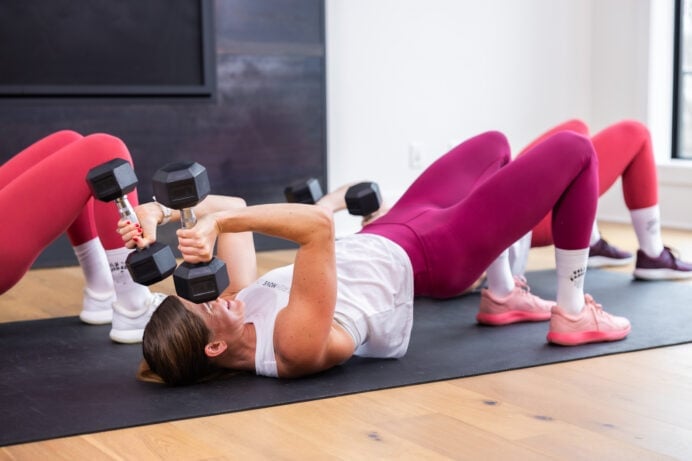
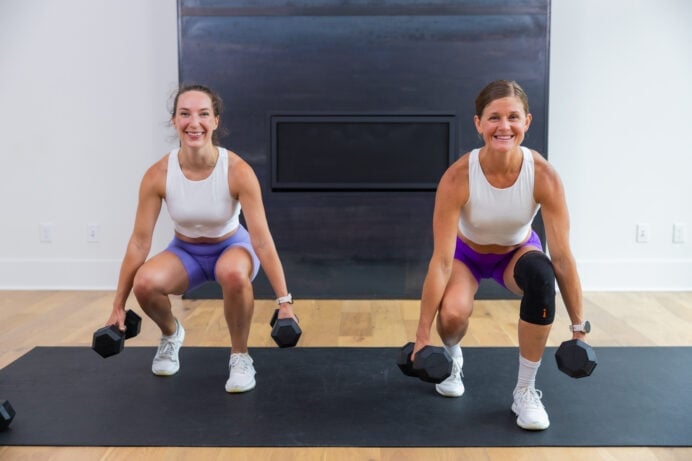
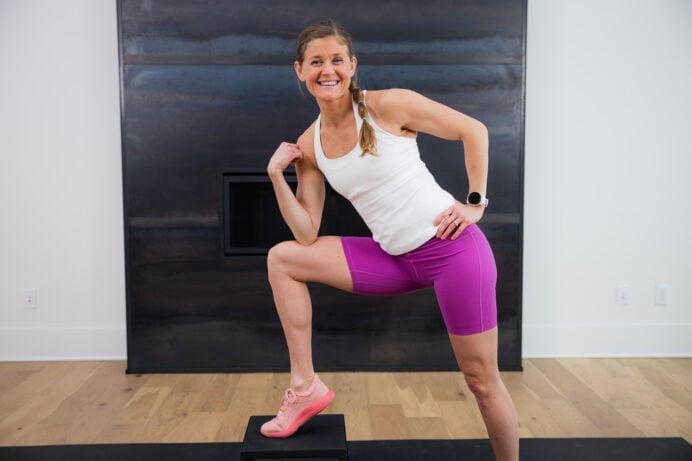
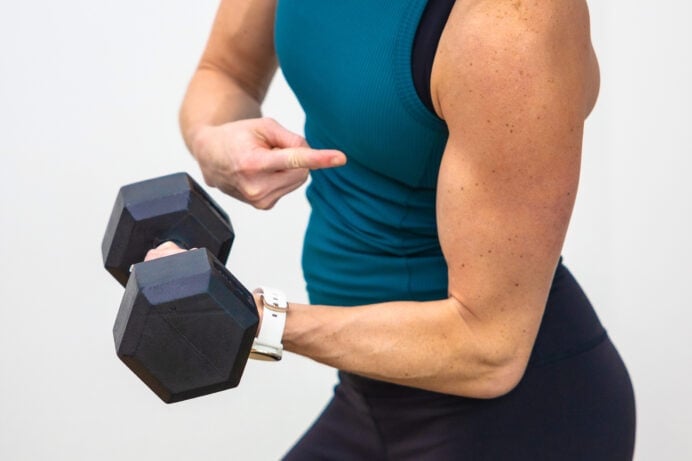
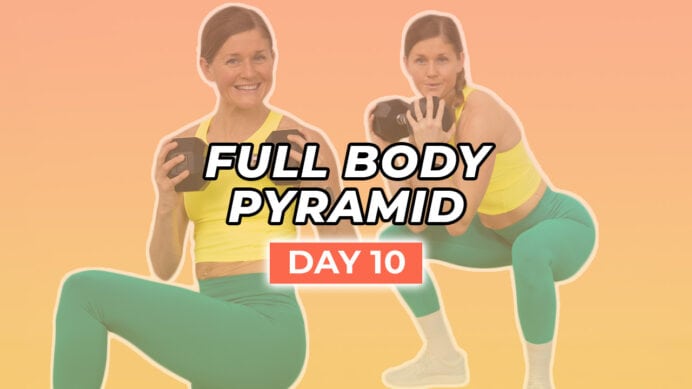
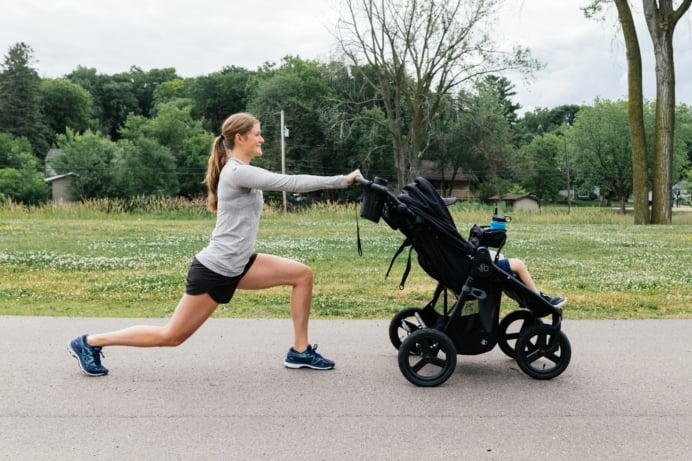
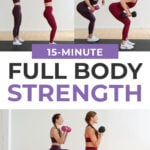
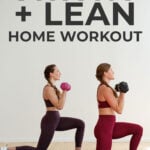
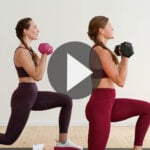
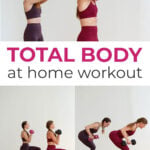
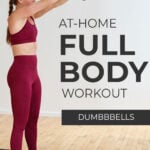
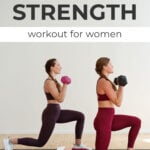
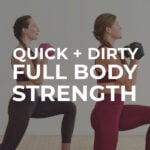
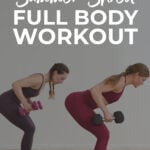
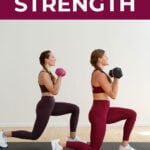
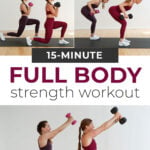
Thank you very much for all of your inspiring workouts. Your workouts motivate me more than any other I have seen or done. I appreciate your knowledge, energy, hard work and creativity. Thank you.
Wendi! I’m so glad you’re loving the workouts! Keep up the great work and keep coming back for more! -Lindsey